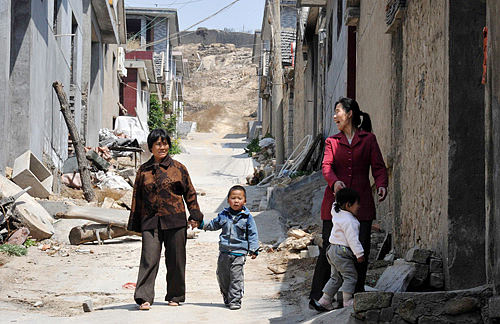|
 |
|
BACK HOME: Villagers living around the Taishan Mountain return home on April 19 after a fire, which broke out April 18, was put out (XU SUHUI) |
Harsher Punishments
Drunk drivers in China could face harsher punishments in the future, including the revocation of their driver's licenses, said a draft amendment to the Road Traffic Safety Law. The amendment will be discussed by the national legislature on April 20.
According to the amendment, drunk drivers will not be able to recover their licenses until five years after the revocation, while the current law stipulates a license suspension of three to six months.
Young Volunteers
China plans to recruit 10,000 college graduates to serve in the country's western regions in 2011, said Zhou Changkui, secretariat of the Central Committee of the Communist Youth League of China (CYLC).
According to the statement released after the meeting, this year's volunteers can apply to serve in categories including elementary education, agricultural technology, health care, grassroots youth work, grassroots social management, and providing services in Xinjiang Uygur Autonomous Region and Tibet Autonomous Region.
The government is planning to increase subsidies for volunteers who choose to work in demanding and far-off regions, said the statement, adding favorable policies in civil service enrollment and other fields for the volunteers were under consideration.
Stronger Assistance
A committee was recently launched to offer various forms of business start-up assistance to help qualified Chinese scientists returning from overseas to run business.
The committee was led jointly by the Ministry of Human Resources and Social Security and the Beijing-based Western Returned Scholars Association, said a notice on April 18.
The notice names the first 25 CEOs and professionals to join the committee's panel.
Previous official statistics show about 1.9 million Chinese studied overseas from 1978 to 2010 and, as of last year, 33 percent of them have returned to China.
The Chinese Government has launched several global expert recruitment programs since 2008, offering favorable policies on taxation and incentives including housing and research projects as well as government awards.
New Internet Regulation
China will implement new regulations to better manage the online business after a dispute between two Chinese Internet giants, Tencent and Qihoo 360, inconvenienced users, the Ministry of Industry and Information Technology (MIIT) announced at a press conference recently.
The move is part of the efforts to strengthen the management of the country's online market and promote healthy and orderly development, said the MIIT. It revealed that it is also working on an online industry development plan to be implemented during the country's 12th Five-Year Plan (2011-15) period.
Tencent, China's largest Internet company, said on November 3, 2010, that it would remotely disable the QQ instant-messaging service on computers that had security software designed by Qihoo 360 installed on them. The announcement was the result of a previous dispute between the companies.
Tencent has 600 million registered QQ users, while Qihoo 360, China's largest free anti-virus software provider, has 300 million clients. Unfair competitive practices between the two companies, especially the threat to unilaterally shut down the instant-messaging service, affected users and caused "bad social consequences," said a MIIT statement. | 